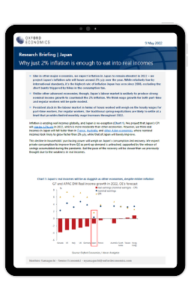Why just 2% inflation is enough to eat into real incomes in Japan
 Like in other major economies, we expect inflation in Japan to remain elevated in 2022 – we project Japan’s inflation rate will hover around 2% y/y over the year. While relatively low by international standards, it’s the highest rate of inflation Japan has seen since 2008, excluding the short bursts triggered by hikes in the consumption tax.
Like in other major economies, we expect inflation in Japan to remain elevated in 2022 – we project Japan’s inflation rate will hover around 2% y/y over the year. While relatively low by international standards, it’s the highest rate of inflation Japan has seen since 2008, excluding the short bursts triggered by hikes in the consumption tax.
What you will learn:
- Unlike other advanced economies, though, Japan’s labour market is unlikely to produce strong nominal income growth to counteract the 2% inflation. We think wage growth for both part-time and regular workers will be quite modest.
- Inflation is eroding real incomes globally, and Japan is no exception. We think real incomes in Japan will fall faster than in France, Australia, and other Asian economies, where nominal incomes look likely to grow faster than 2% y/y, while that of Japan will barely improve.
- Persistent slack in the labour market in terms of hours worked will weigh on the hourly wages for part-time workers. For regular workers, the traditional spring negotiations are likely to settle at a level that provides limited monthly wage increases throughout 2022.
Related Posts

Post
Japan’s politics add uncertainty to BoJ policy outlook
The Bank of Japan (BoJ) kept its policy rate at 0.5% at its October meeting, after a 7-2 majority vote. Two board members again voted for a rate increase. We believe the BoJ will hike in December to 0.75% as incoming data confirm that the economy is performing in line with the bank's forecasts in its quarterly outlook. However, there's a material chance of a delay.
Find Out More
Post
Japan’s December rate hike appears likely, though there is a risk of delay
We've brought forward the timing of the next Bank of Japan (BoJ) 25bps rate hike to December from next year and have added another 25bps hike in mid-2026. This reflects the surprisingly hawkish shift in the BoJ's view since its September policy meeting and upward revisions to our growth and inflation projections, driven by the US economy's resilience.
Find Out More